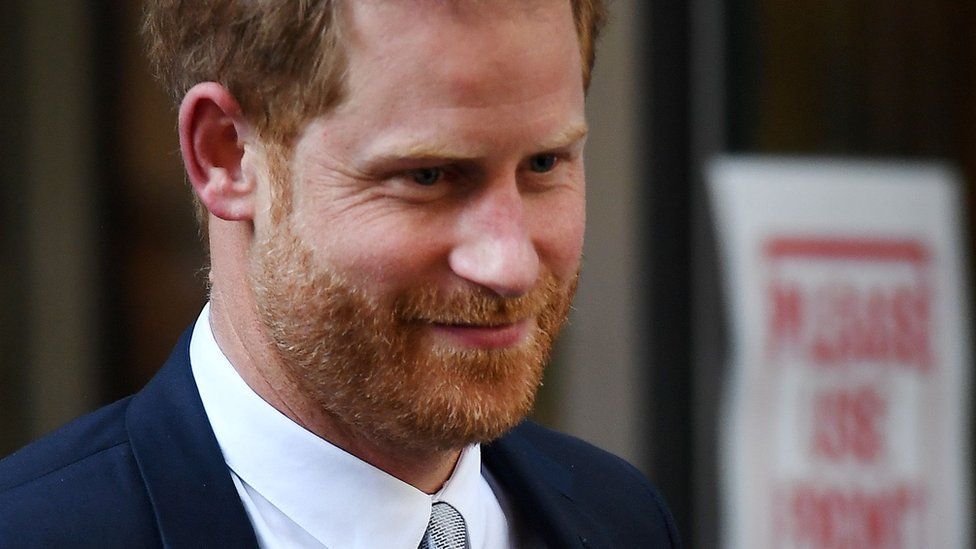
Prince Harry has lost a High Court challenge against the government over the level of his security protection when he is in the UK.
The Duke of Sussex failed to overturn a ruling which saw his security status downgraded after he stopped being a “working royal”.
His lawyers argued there was unfairness in how the decision was made.
But a new High Court ruling has found this was not the case and the decision was also not unlawful nor irrational.
Prince Harry has not responded to the ruling.
The King’s second son launched the legal challenge after being told he would no longer be given the “same degree” of publicly-funded protection when in the country.
The Home Office previously argued his security was decided on a case-by-case basis, and on Wednesday said it was “pleased” by the court’s finding.
Arguing against the Duke’s challenge, Home Office lawyers told the High Court Prince Harry would still have publicly-funded police security, but these would be “bespoke arrangements, specifically tailored to him”, rather than the automatic security provided for full-time working royals.
Much of the legal proceedings, which covered security arrangements for senior figures, were held in private in December, with the ruling issued by retired High Court judge Sir Peter Lane on Wednesday morning.
The ruling could have implications for the Duke’s future visits to the UK, as he previously argued that the lower level of security has made it difficult to bring his family to the country.
In the ruling, Sir Peter rejected the Duke’s case, finding that there had not been any unlawfulness in reaching the decision to downgrade Prince Harry’s security status, and that any departure from policy was justified.
It found the decision was not irrational, or procedurally unfair.
In the 51-page, partially redacted document, Sir Peter said Harry’s lawyers had taken “an inappropriate… interpretation” of how he got security under the Royal and VIP Executive Committee (Ravec) which arranges security for members of the Royal Family and other VIPs. It has delegated responsibility from the Home Office, and has involvement from the Metropolitan Police, the Cabinet Office and the royal household.
The ruling also found that the “‘bespoke’ process devised” for Prince Harry by Ravec “was, and is, legally sound”.
Going into more detail on Prince Harry’s position, Sir Peter wrote in his ruling that the Duke “considers he should receive protective security from the State, whenever he is in Great Britain, because of his position within the Royal Family and factors concerning his past and present situations. Ravec did not share this view.”
He went on to say that in January 2020, the cabinet secretary told Harry’s private secretary “that the claimant should have no expectation of his existing security arrangements remaining the same” and this was “reiterated” at another meeting later in month.
Last year, Prince Harry lost a separate legal bid to be allowed to make private payments for police protection when he was visiting the UK, in a case that also focused on concerns about reduced security since ceasing to be a full-time working royal.
Image source, PA Media
The Duke and Duchess of Sussex stepped back from royal duties in 2020
Prince Harry, who was not present for the December hearing, lives in the US with his wife Meghan, and their two children.
Recent visits by the Duke to the UK have been fleeting. Earlier this month, the 39-year-old spent just over 24 hours in the UK after travelling to the country for a 45-minute meeting with his father, after King Charles’ cancer diagnosis.
Harry’s last appearance at a Royal occasion took place in May, during the King’s Coronation.
That too was short, with the Duke leaving immediately after the ceremony in Westminster Abbey. However, a source told US media outlet Page Six at the time that Prince Harry intended to make “every effort” to get back in time for his son, Archie’s birthday – which was on the same day.
Harry’s strained relationship with his family is also thought to have played a role in the shortness of his visits.
Following the ruling, a spokesperson for the Home Office spokesperson said it was “pleased that the court has found in favour of the government’s position in this case, and we are carefully considering our next steps”.
They continued: “The UK government’s protective security system is rigorous and proportionate.
“It is our long-standing policy not to provide detailed information on those arrangements, as doing so could compromise their integrity and affect individuals’ security.”








